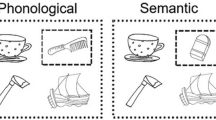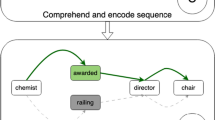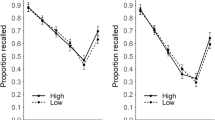Abstract
The current study examined the relationship between verbal memory span and the latency with which a filler-gap dependency is constructed. A previous behavioral study found that low span listeners did not exhibit antecedent reactivation at gap sites in relative clauses, in comparison to high verbal memory span subjects (Roberts et al. in J Psycholinguist Res 36(2):175–188, 2007), which suggests that low span subjects are delayed at gap filling. This possibility was examined in the current study. Using an event-related potentials paradigm, it was found that low span subjects have an onset latency delay of about 200 ms in brain responses to violations of syntactic expectancies after the gap site, thus providing a time course measure of the delay hypothesized by previous literature.
Similar content being viewed by others
References
Bell A. J., Sejnowski T. J. (1995) An information-maximization approach to blind separation and blind deconvolution. Neural Computation 7(6): 1129–1159
Daneman M., Carpenter P. (1980) Individual differences in working memory and reading. Journal of Verbal Learning and Verbal Behavior 19: 450–466
Dien J. (2010) The ERP PCA toolkit: An open source program for advanced statistical analysis of event-related potential data. Journal of Neuroscience Methods 187(1): 138–145
Friederici A. D. (2002) Towards a neural basis of auditory sentence processing. Trends in Cognitive Sciences 6(2): 78–84
Hagoort P. et al (2003) Syntax-related ERP-effects in Dutch. Cognitive Brain Research 16(1): 38–50
Hahne A., Friederici A. D. (1999) Electrophysiological evidence for two steps in syntactic analysis. Early automatic and late controlled processes. Journal of Cognitive Neuroscience 11(2): 194–205
Hestvik A. et al (2007) Brain responses to filled gaps. Brain and Language 100(3): 301–316
Horn J. L. (1965) A rationale and test for the number of factors in factor analysis. Psychometrika 30: 179–185
Kaan E. et al (2000) The P600 as an index of syntactic integration difficulty. Language and Cognitive Processes 15(2): 159–201
Love T. (2007) The processing of non-canonically ordered constituents in long distance dependencies by pre-school children: A real-time investigation. Journal of Psycholinguistic Research 36(3): 191–206
Love T., Swinney D. (1997) Real-time processing of object-relative constructions by pre-school children. 10th Annual CUNY Conference on Human Sentence Processing, Los Angeles, CA
Muller H. M. et al (1997) Event-related potentials elicited by spoken relative clauses. Brain research. Cognitive Brain Research 5(3): 193–203
Nagel H. N. et al (1994) Prosody and the processing of filler-gap sentences. Journal of Psycholinguistic Research 23(6): 473–485
Phillips C. et al (2005) ERP effects of the processing of syntactic long-distance dependencies. Cognitive Brain Research 22(3): 407
Roberts L. et al (2007) Antecedent priming at trace positions in children’s sentence processing. Journal of Psycholinguistic Research 36(2): 175–188
Sabisch B. et al (2009) Children with specific language impairment: The role of prosodic processes in explaining difficulties in processing syntactic information. Brain Research 1261: 37–44
Schneider W. et al (2002) E-prime reference guide. Psychology Software Tools Inc, Pittsburgh
Ueno M., Kluender R. (2003) Event-related brain indices of Japanese scrambling. Brain and Language 86(2): 243–271
Author information
Authors and Affiliations
Corresponding author
Rights and permissions
About this article
Cite this article
Hestvik, A., Bradley, E. & Bradley, C. Working Memory Effects of Gap-Predictions in Normal Adults: An Event-Related Potentials Study. J Psycholinguist Res 41, 425–438 (2012). https://doi.org/10.1007/s10936-011-9197-8
Published:
Issue Date:
DOI: https://doi.org/10.1007/s10936-011-9197-8




